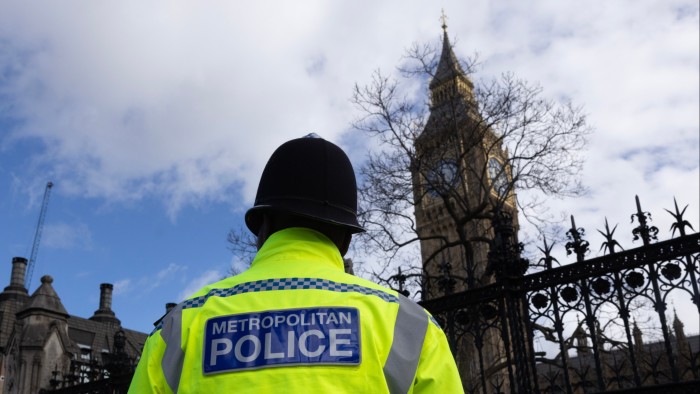Streets are safer but our policing is no better

This article is an on-site version of our Inside Politics newsletter. Subscribers can sign up here to get the newsletter delivered every weekday. If you’re not a subscriber, you can still receive the newsletter free for 30 days
Good morning. Today’s note looks at the past and present of police reform following the home secretary’s big speech this week to local crime commissioners and police chiefs about her plans for an overhaul.
Inside Politics is edited by Georgina Quach. Read the previous edition of the newsletter here. Please send gossip, thoughts and feedback to [email protected]
What’s gone wrong in policing
During the first eight years of the Conservative government, a swath of measures were introduced to improve outcomes in policing. I don’t intend to go through all of them, but here are the changes worth thinking about for my purposes today.
Before 2012, low profile police authorities, including local councillors, were responsible for providing political oversight over police forces in England and Wales. Then those duties shifted to directly elected police and crime commissioners. Also in 2012, the College of Policing was created to spread best practice, improve the quality of policymaking and to drive professional development. And in 2018, the Independent Office for Police Conduct replaced the Independent Police Complaints Commission as watchdog.
The good thing about all of these changes was that it made policing in England and Wales more transparent. But for the most part, that transparency has not led to better policing: indeed in many ways, policing has got worse in that time.
What’s gone wrong? I don’t think it is quite as simple as “cuts to police budgets”. I write a lot in this newsletter about the UK’s ageing population and the upward pressures that creates on health spending. The UK is by no means alone in this and I think there are hard limits on what you can do to fix this problem without more money.

The flipside of this is that crime is largely a young man’s game, a pattern seen across the world. One reason for the remarkable fall in crime across most of the rich world over the past few decades is that there are simply fewer young people around to commit crimes. And in general, improvements in detection, better outcomes in education and a host of other social improvements probably contribute to the overall decline. (I say “probably” because in some ways states are cursed with success when it comes to crime: because rates have fallen almost everywhere, it is really hard to identify what states do that “work” to cut crime, other than “be a rich country in the final quarter of the 20th century”.) Here’s the relevant chart from the ONS (the gap is because the statistics in the missing year are not considered reliable):

Computer-related offences are a slightly different issue (I’ll discuss them in greater detail in a future email, while Georgina recently did a dive into the trouble with fraud here). But broadly speaking, there is no good reason why ageing societies like the UK should not be getting a better quality of policing for less money than it did 20 years ago, simply because of how populations are ageing and how crime is changing.
I think Yvette Cooper is absolutely right to say that the failure has been of politicians and central government to not be sufficiently involved in driving reform. Here’s the key extract from her speech:
Too many politicians — including predecessors in my department — have stood on the sidelines shouting at the police when things have gone wrong . . . Instead of rolling up their sleeves and working in partnership with the police to tackle these challenges head on.
We’ve got really quite good at measuring outputs in policing, but once those outputs tell us “whatever you do, don’t get burgled in Surrey”, nothing really kicks in to solve issues. This is the big thing that Cooper is trying to fix through introducing a new police performance unit in the Home Office and a new police performance framework. How effective it will be at improving policing in England and Wales will depend on an awful lot of things, not least the detail of that framework, but it is a pretty good starting point.
Now try this
I very much enjoyed The Piano Lesson, the new adaptation of August Wilson’s play of the same name. That said, I am a sucker for an incredibly stagey film adaptation — it’s why I love The Humans, The Whale and One Night in Miami — so you may wish to consult Jonathan Romney’s review first.
However you spend it, have a wonderful weekend!
Top stories today
-
Closing in on quangos | UK arm’s-length bodies lack accountability and some have become a “law unto themselves”, the new chair of parliament’s public administration committee has warned, as he set out plans for an inquiry into quangos, including NHS England and Highways England.
-
Torn between the US and EU | Ministers and officials wonder whether Trump’s return could force the UK to either cleave to Washington or to veer towards Brussels or whether Britain can still attempt to chart a middle path on a range of policy flashpoints. Lucy Fisher, Peter Foster and Sam Fleming look at the complicating factors — and the problem with failing to make a choice at all.
-
Sound boarding | Keir Starmer has held talks in Downing Street with BlackRock chief executive Larry Fink, as the prime minister seeks to rebuild relations with business leaders after last month’s tax-raising Budget.
-
Leaseholders frustrated by wait | The UK has been forced to delay new leaseholder rules after ministers discovered “flaws” in a bill that was rushed through parliament before July’s snap general election.
Recommended newsletters for you
White House Watch — Your essential guide to what the 2024 election means for Washington and the world. Sign up here
One Must-Read — Remarkable journalism you won’t want to miss. Sign up here
#Streets #safer #policing




